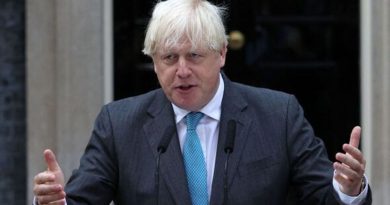For Trump, an Escape, Not an Exoneration
Once again, former President Donald J. Trump beat the rap and once again he wasted no time claiming victory. He released a statement one minute before the presiding officer in the Senate even officially declared that he had been acquitted on Saturday, denouncing his impeachment as “yet another phase of the greatest witch hunt in the history of our country.”
But this one was still different. This one will come with an asterisk in the history books if not a dark stain. This time Mr. Trump did not have the East Room of the White House to summon allies for a celebration to crow about eluding conviction. This was the most bipartisan impeachment in history and even the Republican leader castigated him. This was an escape, not an exoneration.
The president who emerged from last year’s impeachment trial feeling emboldened and used his office to take revenge against those he blamed for the charges against him emerges from this one defeated after one term and secluded behind closed doors in Florida with no government power and an uncertain political and legal future. He forced most Republican senators to stick with him in the trial, but few of them defended his actions, citing constitutional reasons for their votes.
No one condemned him in more forceful terms on Saturday than one of those who voted to acquit him, Senator Mitch McConnell of Kentucky, the Republican leader who for four years held his tongue and worked in tandem with Mr. Trump but has since washed his hands of him. Mr. McConnell accused Mr. Trump of a “disgraceful, disgraceful dereliction of duty” in trying to overturn an election and setting a mob loose on Congress to block the formalization of his defeat and he methodically demolished the former president’s defense point by point.
“There’s no question, none, that President Trump is practically and morally responsible for provoking the events of the day,” Mr. McConnell said. “No question about it. The people who stormed this building believed they were acting on the wishes and instructions of their president. And having that belief was a foreseeable consequence of the growing crescendo of false statements, conspiracy theories and reckless hyperbole which the defeated president kept shouting into the largest megaphone on planet Earth.”
But the sting of his rebuke was tempered by his vote, which Mr. McConnell explained as an unavoidable consequence of his belief that a Senate cannot put a president on trial after he leaves office. Democrats excoriated him for trying to have it both ways, stiff-arming a toxic leader of his own party only when he was out of office without actually holding him accountable. But he also validated the Democrats’ case against Mr. Trump.
The Trump Impeachment ›
What You Need to Know
- A trial was held to decide whether former President Donald J. Trump is guilty of inciting a deadly mob of his supporters when they stormed the Capitol on Jan. 6, violently breaching security measures and sending lawmakers into hiding as they met to certify President Biden’s victory.
- The House voted 232 to 197 to approve a single article of impeachment, accusing Mr. Trump of “inciting violence against the government of the United States” in his quest to overturn the election results. Ten Republicans joined the Democrats in voting to impeach him.
- The Senate acquitted Mr. Trump of the charges by a vote of 57 to 43, falling short of the two-thirds majority required for a conviction.
- Without a conviction, the former president is eligible to run for public office once again. Public opinion surveys show that he remains by far the most popular national figure in the Republican Party.
Source: Read Full Article


